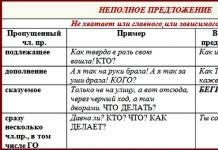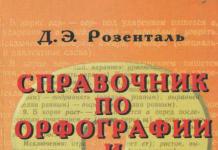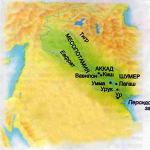Spelling adverbs
An adverb is a part of speech around which there have been ongoing discussions in Russian linguistics over the past three centuries. Even A. A. Barsov (1730–1791), the author of the first “Russian Grammar”, believed that the etymological meaning of the term “adverb” (in Latin ADVERBUM - “preverb”, from the word VERBUM - “verb”) does not correspond to the real functions this part of speech in the language, because adverbs are also used before an adjective and before other adverbs. Consider examples:
DRAW BEAUTIFULLY (adverb + verb)
VERY BEAUTIFUL (adverb + adjective)
VERY HARD (adverb + adverb)
In the 19th century, scholarly opinions about this part of speech were more radically divided. K. S. Aksakov and F. I. Buslaev believed that such a part of speech does not exist at all. But A. A. Potebnya “returned” the adverb to the morphology of the Russian language, and academician A. A. Shakhmatov even believed that the adverb occupies a central place in the system of parts of speech. The reason for these disputes is that words, which are usually called adverbs, are formed from words of other parts of speech (from nouns, adjectives, pronouns, numerals, verbs) and are very similar to them. Consider a few examples:
the adverb TOVSTRECHU (“sail /where?/ towards the wind”) was formed from the combination of the preposition ON with the noun VSTRECHU (“to be late for a meeting with a colleague”);
the adverb IN OUR way (“everything turned out / how?/ in our way”) was formed from a combination of the preposition ON and the pronoun NASHEMU (“in our case”);
the adverb KRASIVO (“to speak /how?/beautifully”) is very similar to the short adjective KRASIVO (“the evening sea /what?/beautiful”).
Sometimes when a word passes from any part of speech into an adverb, it completely retains its spelling. This happened with the adverb BEAUTIFUL. But it happens that a newly formed adverb changes its graphic appearance in comparison with the original word or combination of words: it is written with a hyphen (IN OUR WAY) or together (TO WAY). This is precisely what causes difficulties when choosing the correct spelling of adverbs.
Continuous, hyphenated and separate spelling of adverbs depends on how they were formed. Let's consider each of the spelling options in order.
CONCLUSION adverbs are written in six cases:
If the adverb was formed relatively long ago and it contains nominal forms that are not currently used in the literary language, for example: VODOVOL, SHARED, LOCKED, AWAY, BACK, BACK, BY SPIDGE, SILENTLY, ZAPANIBRATA, FLIGHT, HASHY, ALERT, ON AN ETOSHCHAC, NEVPOPAD, EARLY, EARLY etc. In other words, the adverb VDREBEZGI is written together, since there is no form of DREBEZGI in the modern literary language.
If an adverb was formed by combining a prefix with another adverb, for example: VERY, FOR FREE, FOREVER, THE DAY AFTER TOMORROW, EVERYWHERE, IN ADVANCE, etc. Let's take a closer look at the last word: the prefix FOR is added to the adverb EARLIER, and a more complex adverb IN ADVANCE is formed, which, naturally, is written together .
If an adverb is formed by combining a preposition with an adjective. Both full and short forms can participate in the formation of adverbs. Full adjectives answer the questions WHAT?, WHAT?, WHAT?, WHAT?, in the nominative case. For example, the adverb from the phrase MADE BY MANUAL was formed by merging the preposition B with the adjective MANUAL (in the nominative case - MANUAL). In a similar way, the adverbs TIGHT, SCATTERED, DARK, CLEAR, etc. appeared. Short adjectives answer the questions WHAT?, WHAT?, WHAT? and WHAT ARE THERE? and have truncated endings compared to full adjectives, compare: HOT (answers the question WHAT? - this is the full form) and HOT-A (answers the question WHAT? - this is the short form). For example, an adverb that was created by merging the preposition C and the short adjective HOT must be written together. In a similar way, the adverbs LEFT, DRY, DEAD, FROM A FAR, QUICKLY, LITTLE, LOWLY, SLOWLY were formed.
If an adverb was formed by combining a preposition with a noun, but between the preposition and the noun from which the adverb was formed, a defining adjective, pronoun, numeral cannot be inserted without changing the meaning, or if a case question cannot be posed to the noun: IN ADDITION, FORD, VLET, AGAIN, TRULY, AROUND, FOLLOWING, SIDEWAY, INTERBEND, FLIGHT, FIT (SUIT), ON TIME (ARRIVE), SIDEWAY (PUT ON A HAT), TOWARD, RIGHT AWAY, HEADWAY (BREAK), IN SPITE, BY MEMORY (LEARN), FORWARD, HALF, INTERCEPT, ON SHOW, FINALLY, FOR EXAMPLE, RENTED, CHANTED, ALONG, FORCED, RANDOMLY, THE MORNING (RETURN), IN A ROW, Occasionally, etc. This does not apply to words that are formed from the nouns TOP, BOTTOM, FRONT, BACK, HIGH, DAL , CENTURY, BEGINNING and have spatial or temporal significance. Despite the possibility of placing a defining word in front of some of them, they are written together, for example: UP, UP, UP, UP, UP, TOP; DOWN, BELOW, BOTTOM, BOTTOM, BOTTOM; FORWARD, FORWARD; BACK; UP; IN THE DISTANCE, IN THE DISTANCE, IN THE DISTANCE; FOREVER, FOREVER, FOREVER, FOREVER, FOREVER; FIRST, FIRST.
If an adverb was formed by combining a preposition with a pronoun, for example: BECAUSE, THEN, THEREFORE, THEREFORE, AT ALL, Draw. AT ALL.
If the adverb was formed by combining the preposition B or NA with collective numerals. Numerals in Russian are divided into three groups: quantitative (for example, TWO, FIVE, TEN), ordinal (SECOND, FIFTH, TENTH) and collective (TWO, FIVE, TEN). In accordance with the rule, adverbs formed only from the numerals of the last group are written together, for example: DOUBLE, TWO, SIX. The spelling of adverbs formed from numerals of other types will be discussed below.
The adverb is written WITH A HYPHEN in four cases.
If it is formed by repetition of the same word (for example, QUICKLY-QUICKLY), the same stem (CROSS-CROSS) or synonymous words (QUIETLY-PEACEFULLY).
If an adverb is formed from full adjectives and pronouns ending in -OMU, -EMU, -TSKI, -SKI, -I using the prefix ON, for example: IN A NEW WAY, IN YOUR WAY, IN GERMAN, IN RUSSIAN, IN- BIRD.
If an adverb is formed from an ordinal number ending with -ИХ or -ИХ, using the prefix B or VO, for example: SECOND, FIFTH.
If an adverb is formed with the help of particles that are always written with a hyphen: -THAT, -EITHER, -SOMETHING, SOMETHING, -SO. Such adverbs are called indefinite, for example: SOMEWHERE, SOMEWHERE, ANYWAY, SOMEWHERE.
Adverbs that are written separately, it is more fair to call adverbial combinations, since these are combinations of words that belong to other parts of speech and have only acquired some signs of adverbs. Perhaps some time will pass, and they will turn into full-fledged adverbs and will be written in the dictionary with a hyphen or even together, but now such words have only just embarked on the path of becoming adverbs. Among adverbial combinations written separately, four groups can be distinguished.
The first group includes combinations of nouns with various prepositions, in which the noun has retained at least some case forms. Consider the following examples: SHATTING, SQUATTING; ABROAD, ABROAD, FROM ABROAD; AT HOME, AT HOME; TO MEMORY, BY MEMORY; IN CONSCIENCE, IN CONSCIENCE; BY HAND, NOT BY HAND; UNDER THE ARMPITS, UNDER THE ARMPITS, UNDER THE ARMMIT, UNDER THE ARMMIT, FROM UNDER THE ARMMITS; ON BAIL, ON BAIL. An adverb is an unchangeable part of speech: it is neither inflected nor conjugated. But if a word has several case forms, then it is not an adverb and must be written separately with the preposition.
The second group of adverbial combinations, which are written separately, consists of a preposition ending with a consonant and a noun beginning with a vowel. For example: IN AN HUG, ALONE, IN REVENGE, AT POINT POINT, AT PLEASE, WITHOUT RESISTANCE, WITHOUT TIRED and others.
The third group consists of adverbial combinations, consisting of two repeated nouns, sometimes with a preposition between them. For example: HONOR WITH HONOR, ODD WITH ERROR, SIDE BY SIDE, EYE TO EYE, DOOR TO DOOR.
The fourth group is a less clearly defined set of combinations of nouns with prepositions that are used in an adverbial meaning or are simply similar to adverbs because they answer the question HOW?. For example: WITHOUT KNOWING, WITHOUT A REQUEST, WITHOUT LOOKING BACK, WITHOUT PURPOSES, WITHOUT TIRED, IN THE INSOLE, TO THE FUCK, TO DEATH, ON THE RUN, IN VIEW, AT THE EYE, ON THE RUN, ON THE WALK and others. The spelling of such words must be memorized, and if in doubt, seek help from a spelling dictionary.
It is necessary to remember the exception words that are written differently than indicated in the rule: IN THE OPEN, ON THE MOUNTAIN, IN LATIN, EXACTLY.
EXERCISE
There are not many clamps and carts, it will be necessary to start it all in winter, both well and happily. [A. A. Fet. Autumn chores]
One of the four ears hung completely like a dog. [YU. Mamleev. End of the World/Black Mirror]
I would like to leave you something as a souvenir. [A. S. Pushkin. Kirdzhali]
You need to prepare for the exit in advance (especially if there are a lot of passengers). [Rules of conduct in ground transport]
Following her, a German doctor, in a black caftan and a scholarly wig, entered, felt Natasha’s pulse and announced in Latin, and then in Russian, that the danger had passed. [A. S. Pushkin. Moor of Peter the Great]
They began to live and get along with Valyusha, and little by little it began to dawn on them that they were complete strangers to each other. [IN. Shukshin. My husband's wife accompanied him to Paris]
Yes, there was discipline then, not like now, and they worked conscientiously, sparing no effort.. [O. Glushkin. Last flight]
I immediately feel cold, although I am dressed in a warm monkey blanket and a fur hat, over which I also have a Budyonnovka cap, and a woolen shawl tied crosswise. [A. Chudakov. Darkness falls on the old steps]
I need money not the day after tomorrow, but today. [A. P. Chekhov. Bear]
He was tired of getting ready to go abroad every day and really wanted to go home to his place in Novoselki. [A. P. Chekhov. Compensation disorder]
For a cup of wine you pay five times, six times more than in a tavern. [F. M. Dostoevsky. Notes from a Dead House]
We need to see the world in a new way. [YU. Olesha. Notes of the writer]
The children who were rolling on the ice rushed scattered onto the shore like sparrows. [D. Mamin-Sibiryak. Bad Comrade]
The bell rings on the front porch: an aristocratic figure, a decent suit, rented. [IN. Gilyarovsky. Moscow and Muscovites]
The connections are severed, the secret is forever lost... the secret is born! [A. Bits. Notes of a goy]
The school director wrote him a pass in German to the city, to the army headquarters. [A. N. Tolstoy. Strange story]
All the boats were smashed into smithereens, into splinters, and the last remnants were scattered across the sky and sea. [B. Zhitkov. Geography lesson]
And we waited for you until seven o’clock, then we decided that you wouldn’t come at all. [A. P. Chekhov. Cripple]
Secondly, it was much more important than first. [E. Limonov. We had the Epoch Times]
The Frenchman did not have that kind of money and went home, eating poorly. [IN. Shukshin. Aliens]
Along the pavement, close to each other, shimmering with varnish and filling the night with the hubbub of horns and radios, slowly, in several rows, endless lines of cars of strange foreign breeds crawled. [WITH. Gandlevsky.<НРЗБ>]
Just recently, in the center of Leningrad, on Kamenny Island, children going to school in the morning saw two moose wandering under the trees. [AND. Sokolov-Mikitov. Moose]
Mikhail the Brave walked alongside the others, like a simple warrior. [N. M. Karamzin. Marfa Posadnitsa]
They are all familiar with each other; They wore their clothes around so you wouldn’t know who was a corporal and who was a general. [M. N. Zagoskin. Roslavlev]
Because of this, he often answers incoherently, sometimes at random, and the objects getting in the way in his head further increase his timidity. [N. V. Gogol. Nevsky Avenue]
A man lives openly, doesn’t hide from people, doesn’t do harm to others, and helps whomever he can according to his strength and ability. [P. P. Bazhov. Circular lantern]
Little by little her tired head bowed: the poor girl had not slept for several nights, never leaving her sick brother, and now dozed off slightly. [IN. M. Garshin. The Tale of the Toad and the Rose]
Don’t think that he’s on an empty stomach, no, he crushed two pounds of rolls in the morning and had lunch at noon, as he should. [M. Bitter. In people]
I suppose you’re not writing for nothing, for money! [A. P. Chekhov. At Christmas time]
There was melancholy in his eyes, and a chessboard under his arm. [IN. Vysotsky. About the game of chess]
For example, there are no cockroaches in our dining room! [IN. Vysotsky. Dolphins again]
The population lived quietly. [Sasha Cherny. Soldier's Tales / Peaceful War]
She tapped them and they flew off, just like paint from old mannequins. [L. Ulitskaya. Journey to the seventh side of the world]
Their types and images are different, but the root of good is the same everywhere, for nature is unchanged nowhere. [A. N. Radishchev. Having laid an insurmountable barrier...]
– What do you think love is? – the girl asked. [A. A. Fet. Cactus]
A? Who sent you, who benefits from this! [IN. Vysotsky. Dolphins again]
Truly, the blood stops and the brain is poisoned by the mere thought that people with such criminal intentions breathe the same air and are similar to us in their external appearance. [N. Eidelman. Letter to the Tsar]
The work at the dispensary, as in any other institution, was carried out in an extremely routine and senseless manner. [L. Ulitskaya. Daughter of Bukhara]
Finally I will be an accountant! [A. P. Chekhov. From the diary of an assistant accountant]
During assembly, many parts had to be recast and resharpened, adjusted, and cleaned manually. [A. Beck. Talent]
We walked with honor, as much as was enough for our wealth. [P. P. Bazhov. Circular lantern]
When the sovereign was still in Vilna, the army was divided into three... [L. N. Tolstoy. War and Peace]
When they died, it was bitter and hard for him, and when they grew up, they left him to struggle alone with severe need. [IN. G. Korolenko. Makar's Dream]
Some transporter will grab a lamb somewhere on the way out of the factory, and then slowly lead it behind his cart. [P. P. Bazhov. Vasina Mountain]
Malchish sits by the chimney on the roof, and Malchish sees an unfamiliar horseman galloping from afar. [A. Gaidar. A tale about a military secret, Malchisha-Kibalchisha and his firm word]
Life is life, and if some issue cannot be resolved, a person lives with this issue side by side. [IN. Makanin. Sur in Proletarsky district]
An order followed to give Khabarov two hundred rubles a year in addition to his salary. [AND. A. Goncharov. A vicissitude of fate]
The women swore loudly and pushed each other with their wallets. [D. Kharms. The start of a very nice summer day]
The opponents played in a draw. [A. Beck. Talent]
Those three looked at her intently, as you can only look at your friend. [Georgy Vladimov. We all deserve better]
You need to peel, then roll in crushed breadcrumbs and fry until dry so that they crunch on your teeth. [A. P. Chekhov. Ivanov]
In the bow of the vessel, behind the face, there is a cockpit with two round transoms glazed with aircraft glass. [IN. Astafiev. King Fish]
Often what is put on display is not really there. [IN. Postnikov. Why does the snake have such a long neck?]
Sitting high on a tree branch, holding a cone in their front paws, the squirrels quickly gnaw out the seeds from it, dropping the scales spinning in the air, throwing the gnawed resinous core onto the snow. [AND. Sokolov-Mikitov. Squirrels]
The father, in retaliation for switching the program, talked about space aliens - the most hated topic for the mother. [A. Bits. Forest]
But here I am, twice your age, and I can’t figure out life. [A. Averchenko. Expert of a woman's heart]
Hyphenation
- Adverbs formed by repeating words or stems: barely, for a long time, for a long time, firmly, after all, willy-nilly.
- If an adverb is formed from two synonyms: unexpectedly, unexpectedly, in a good time.
- Adverbs with the prefix PO- and suffixes –OMU, -EMU, -SKI,- KI, -I: kindly, kindly, friendly, German, birdlike.
- With prefixes VO-, V- and suffixes –ИХ, -Их : Firstly Secondly.
- With the suffixes -TO, - EITHER, - ANYBODY, the prefix SOME-: somewhere, somewhere, someday, somewhere.
Continuous writing
The combined and separate writing of adverbs causes certain difficulties. This is because although there are rules for writing, there are many exceptions to them. Therefore, there are a lot of words you just need to remember how they are written.
- If the adverb is formed from adverbial combinations: in two, on the right, end to end, on display. BUT: on the run, at a swoop, at the joint, to laugh.
- If formed by combining prepositions with adjectives, pronouns, adverbs: slowly, hard-boiled, in four, in two, with might and main, completely, everywhere, forever.
- Adverbs with the meaning of circumstances of place and time, containing nouns: top, bottom, before, back, height, depth, distance, width, century, beginning. For example: up, forward, behind, at the beginning.
- If an adverb without a prefix into which the preposition is transferred is not used: in abundance, after, to pieces, completely, familiarly, from under the brows, on the sly, by the way, on one side, down the drain, on an empty stomach, by hearsay, one by one, early in the morning, half asleep, too much.
- Combination of the preposition B and nouns with a vowel: in exchange, point-blank, in an armful.
- Combinations of prepositions WITHOUT and DO with nouns: to no avail, until I drop.
- Combinations of nouns with other prepositions: on the fly, on a grand scale, abroad, at home.
- Some combinations that have a figurative meaning: fundamentally (wrong), (this is) to our advantage, (to get) into a dead end.
Separate writing
Distinguish adverbs from combinations of prepositions with nouns, ask questions, look at the meaning of words:
perform out of spite - complain about evil
stand to death - go to death
break it on your head - put it on your head.
These are the rules for writing adverbs. However, there are many exceptions, words that need to be remembered.
Remember the spelling of adverbs
Continuous writing
|
Fording |
At the same time |
In reality |
|
Up |
Familiar |
Unknown |
|
Plenty |
Often |
By chance |
|
Catch up |
From the inside |
Not for nothing |
|
Shattered |
From under his brows |
Not at all |
|
Borrow |
from time immemorial |
Partly |
|
At launches |
Since ancient times |
Nearby |
|
In the end |
supine |
Platoon |
|
Briefly |
Topsy-turvy |
Serves it right |
|
Overlay |
untucked |
Truly |
|
Draw |
At attention |
For now |
|
Truly |
Ready |
By hearsay |
|
Back home |
To the ground |
Involuntarily |
|
Afterwards |
By heart |
One by one |
|
Racing |
Light |
Afternoon |
|
Swim |
Backhand |
Simply |
|
Flatly |
Equally |
|
|
Half turn |
Vying with each other |
To the extent |
|
In a hurry |
In spite of |
In the heat of the moment |
|
Squat |
On the spot |
Foolishly |
|
Out of order |
Directly |
From a young age |
|
Unwind |
Chanting |
I'll go blind |
|
Taken aback |
On an empty stomach |
Early in the morning |
|
Scattered |
At random |
Woke up |
|
Hand to hand |
Run away |
Akin |
|
Dry |
On alert |
Syzmala |
|
Vyav |
Frankly |
Immediately |
|
Dry |
By heart |
Too |
|
Clean |
Separate writing
|
Without knowledge |
Indiscriminately |
Without stopping |
|
Carelessly |
Without asking |
Tirelessly |
|
To failure |
Uselessly |
Side by side |
|
Without clearance |
Without restraint |
As |
|
Out of the ordinary |
To death |
On hand |
|
Finally |
Till I drop |
At the trot |
|
In moderation |
For eyes |
At a gallop |
|
In mockery |
After midnight |
To the glory |
|
In leg |
From under the arms |
For a laugh |
|
In trade for |
Just |
Conscientiously |
|
Hugging |
At random |
On guard |
|
Just barely enough |
On the run |
With a bang |
|
Skin-tight |
To the side |
On tiptoe |
|
In girth |
Forever and ever |
On the clock |
|
Fully armed |
By weight |
Out of sorts |
|
Out loud |
By the look |
Not in moderation |
|
By oneself |
Taste |
Unlike the example |
|
A hundred times |
By eye |
Not good |
|
Openly. |
Amazingly |
Spelling of adverbs is a section in spelling. Difficulties in correctly using this part of speech in writing often arise. Hyphenation of adverbs is the topic of this article.
Prefix "by"
One of the common spelling errors is the separate spelling of adverbs formed from adjectives or pronouns and ending in -emu, -om, -i, -ki. If schoolchildren rarely make mistakes in words such as in Russian, differently, then in other cases even adults experience difficulties.
Hyphenated spelling of adverbs is appropriate when the prefix “by” is present. Examples:
- In your opinion, everything you do should not be criticized?
- In a good way, this essay on the work of Alexander Kuprin needs to be completely rewritten.
- She hugged him like a friend which he didn't like at all
- French In this aristocratic house, even the maid spoke.
- The girl resembled a cat: she walked like a cat, her movements were distinguished by softness and incredible plasticity.
- He still he returned home at dawn and preferred not to answer all sorts of questions from his wife.
- The girl went into the apartment of her future stepmother and like a businessman looked around.
- She went to the pool three times a week for a year, but only learned to swim Like a dog.
It is important not to confuse such cases with words such as little by little, for a long time, less, more.

Possessive pronouns
You should also name examples that are found, as a rule, in works of art. Hyphenated spelling of adverbs is used if parts of speech are formed from Examples:
- The poet immensely loved the work of the prose writer Dovlatov, and therefore the highest praise from his lips were the words “It sounds Serezha's way».
- She imitated her sister in everything. I even quarreled with my mother differently.
Compound adjectives
Hyphenated spelling of adverbs also occurs when these parts of speech have the prefix “by” and are formed from two stems. But this does not mean that two spelling marks should be placed in such words. The word social democrat is written with a hyphen. An adverb formed from this noun and the prefix “by” will have only one spelling sign. Examples:
- They held meetings as they thought in a social democratic way, and therefore they shouted socialist slogans and loudly argued about issues of the labor movement.
- His father and grandfather were non-commissioned officers. He also had this rank. That's why he always behaved in non-commissioned officer's style and, that is, he played a lot of cards and started intrigues with cabaret singers.

Prefix "in"
Hyphenated writing of adverbs, examples of which are given above, involves the use of one sign. But there are adverbs consisting of several particles and two or more hyphens. For example: twenty-fifths, one-hundred-thirty-fourths.
Simpler designs are known to everyone. Hyphenated spelling of adverbs (the spelling rule is included in the seventh grade curriculum) is always used with the prefix “v”. Examples:
- Firstly, the student was late for the exam.
- Secondly, during the semester he did not attend a single seminar.
- Third, he failed the exam again.
Affix "that"
Hyphenated writing of adverbs (a table of rules and examples is presented below) is appropriate in words such as once, somehow, somewhere, from somewhere, for some reason. Examples:
- For some reason it seemed to him that if he left today, he would lose her forever.
- Somewhere Cannons thundered in the distance and shells exploded.
- Somehow he returned home furious and told her everything that had haunted her for many years.
- They tried their best to hide from the public everything that happened in the house, but from somewhere information, despite all efforts, still leaked out.

Affix "either"
Adverbs from somewhere, ever are also written with a hyphen. Examples:
- Vasiliev is the most gifted student of all who ever she had.
- Maybe anyone and would have played this role, but the director needed an actor of this exact type.

Other cases
Adverbs with the affixes “something” or “something” are not written together or separately. The writing of such parts of speech can only be hyphenated. Examples:
- Some day you will remember these words.
- She wrote an essay somehow.
Words formed by repetition are also written with a hyphen. Examples:
- He clearly remembered that the night light in her room was on that evening barely.
- There was a bit of flattery in his new book, a little lies, and immeasurable pathos.
- The boy was spoiled, completely unadapted to everyday life, and at the age of seven he did not know how to tie his shoelaces criss-cross.
- Mother tight I tied a thick woolen scarf over the girl’s coat and sent her outside.
- Little by little he learned to write simple, uncomplicated phrases in German.
- Unexpectedly his beloved aunt came to visit from a deep Saratov village.
- Hearing these rude and unfair words, his father advised him to get out I'll say hello.
- WITH floundering bays such serious decisions are not made.
- From then on he sat in mathematics lessons quietly o and even sometimes answered the teacher’s questions.
- At the very least the three of them were able to complete this task.
The article sets out the rules and explanations for the topic “Consolid and hyphenated writing of adverbs.” The table below contains the information in a more condensed form.
Na-mountain is a word from technical terminology. This adverb is always written with a hyphen.
The peculiarity of the adverb in the Russian language is that this part of speech has no conjugation and does not change according to gender, case and number. The spelling of adverbs depends on several factors, each of which is described in this article. In addition, there are available examples for each rule, as well as exceptions to them.
Features of spelling adverbs
Adverb in Russian- this is an independent part of speech that does not change in numbers, gender and cases and has no conjugation. In phrases it can be adjacent to other adverbs, verbs, adjectives and nouns. The spelling of adverbs depends on the method of their formation and which syllable is stressed in the word.
Integrated and separate writing of adverbs
Table Integrated and separate writing of adverbs includes rules, examples and exceptions.
|
They write together |
Written separately |
||
|
Adverbs formed from adverbs, pronouns or adjectives using prefixes |
Completely, forever, why, because, rashly, completely, manually, directly |
Adverbs with prepositions formed from words that begin with a vowel |
In the morning, in the open, crazy |
|
Adverbs formed from nouns not used in modern speech |
To pieces, to pieces, to the ground, early in the morning |
Adverbs formed from prepositions without, before, with, under and nouns |
On the run, without holding back, to the fullest, in a big way Exceptions: completely, to the bottom, to the top, from time to time, foolishly, shoulder-to-shoulder, in a row, sometimes |
|
Adverbs with prefixes in-, on-, formed from collective numerals |
Three, four, seven |
Adverbs formed from collective numerals and prepositions By |
Four at a time, a hundred at a time |
|
Adverbs with the meaning of space and time |
Forward, upward, first |
If a noun as part of an adverb has retained its case form |
On bail (on bail), under the armpits (under the armpit), on conscience (according to conscience) |
|
Adverbs in which a noun cannot be questioned |
Out loud, half way, in the morning |
Adverbs in which a qualifying word can be added between the preposition and the noun |
At a gallop (at full gallop), at a dead end (at a dead end in life) |
|
Adverbs formed with a preposition V, particles floor and noun |
Exceptions: half a face, half an apple, half an egg |
Adverbs consisting of prepositions in, on and nouns with endings -ah(s) |
In hearts, in heads, in joy Exceptions: in a hurry, in the dark, in a hurry |
Hyphenated (semi-continuous) spelling of adverbs
The following adverbs are written with a hyphen:
- Formed from pronouns and full adjectives using a prefix in- (in Japanese, differently, in your way).
- Formed from ordinal numbers using a prefix in-(in-) (secondly, thirdly, fifthly).
- Adverbs with particles -something, -or, -that, still-, something- (from somewhere, someone, something).
- Complex adverbs formed by repeating the same word or two synonyms (little by little, a long time ago, a little bit).
Need to remember: on-mountain(term), exactly, side by side, one by one, because, therefore, therefore.
Writing suffixes at the end of adverbs
1. At the end of adverbs formed from full adjectives the following is written:
TOP 5 articleswho are reading along with this
- suffix -O after hard consonants (cold - cold, strong - strong, loud - loud);
- suffix -e after soft consonants (brilliantly - brilliantly, internally - internally, sincerely - sincerely).
2. At the end of adverbs after sibilants, in an unstressed position it is written -e (brighter, louder, stronger). Under stress - -o (hot, good, light). Exception - more.
3. At the end of adverbs formed from short adjectives it is written:
- suffix -O in-, behind-, on (to the left, again, for a long time);
- suffix -A, if the adverb has prefixes to-from-(-is), from-(co-) (from afar, to the right, completely).
4. At the end of adverbs after sibilants h And w is written b (jump, backhand, all over). Exceptions: wide open, already, married, unbearable.
Spelling NOT and NOR with adverbs
NOT written together with adverbs in the following cases:
- if the adverb is without NOT not used (inconspicuous, unbearable, impossible);
- if adverb with NOT can be replaced by a synonymous adverb without negation (not bad - good, inexpensive - cheap, slightly - weak);
- If NOT is under stress (no need to do it, no time to call, nowhere to get it).
NI written together with adverbs only in unstressed position and used with a second negation (I’ll never finish, I can’t cope, I won’t be surprised by anything).
The topic “Spelling adverbs” is studied in Russian language lessons in 7th grade.
Article rating
Average rating: 4.5. Total ratings received: 139.
The following types of adverbs are written with a hyphen:
1. Adverbs formed from a combination of the preposition po and a full adjective or possessive pronoun and ending in -mu, -ki, -i: in a fighting way, in a good way, in a kind way, in a snake way, in every way, according to - in my opinion, in our way, in our way (simple); in our language (simple), in mountain, in Turkish, in ancient Egyptian, in Kakovsky (simple); like a child, like a jackal, like a bear.
By analogy with formations like in Russian, it is written with a hyphen and a Latin adverb.
Adverbs of the analyzed type are sometimes formed from adjectives that are written with a hyphen. In such adverbs, a hyphen is placed only after po: in social-democratic (social-democratic), in New York (New York).
Notes: 1. Adverbs, as before, apparently empty 65, previously written together as an exception to the general rule, are now written with a hyphen.
2. Adverbs starting with po- and ending with -mu, formed from non-possessive pronouns, are written together: therefore (this), because (that), therefore (this), why (that). Remember: life was different.
3. A hyphen is not placed in the phrase one at a time: They diverged not immediately, but one at a time (As.).
2. Adverbs formed from ordinal numbers using the prefix v-(vo-): firstly, secondly, thirdly, fourthly; by analogy: lastly. The list of similar adverbs used in the language as introductory words is small and practically ends with the adverb in the tenths. But in artistic texts other formations are also possible: It happened like that, but this is in the tenths, in the hundredths (L. B.).
3. Adverbs formed by repeating the same word: a little, just about, barely, a long time ago, a lot; repetition of the same root, complicated by various prefixes and suffixes: a long time ago, just, apparently, invisibly, little by little, little by little, tightly, first of all; repetition of synonyms: unexpectedly-unexpectedly, I'll pick you up (but: I'll pick you up and say hello), unthinkingly-unexpectedly, not today-tomorrow, quietly-quietly, without-duty-free, any-expensively, sewn-covered (simple), topsy-turvy - inverted (simple).
But prepositional combinations, close in meaning to adverbs, which include repeating nouns, are written separately: live side by side; talk face to face; show up at any time; It doesn't get any easier; step in the same footstep; go hand in hand (‘act amicably, jointly, unitedly’); live soul to soul; honor to do something; He carefully held the horse and led it step by step with the horse of his fellow traveler (gas).
Remember: adverbs criss-crossed, willy-nilly, are written exactly with a hyphen.
Non-prepositional combinations are also written separately, consisting of two nouns, the second of which is in the instrumental case: rank by rank, fool by fool, honor by honor, wolf by wolf, pig by pig, eccentric by eccentric, cloud by cloud, snake by snake.
Notes: 1. Professionalism is written with a hyphen.
2. The adverb in time (‘in a timely manner’) is written together in accordance with the rules on the spelling of adverbs formed from nouns. It must be distinguished from the combination of the preposition during and the noun time: during the summer holidays.
3. Word combinations such as roaring, trembling, trembling, standing upright, swarming, pouring, crying, crying, burning [roaring, trembling, crying, etc. are adverbs and define verbs: roars, trembles, cries “how?” "].
05 The words, apparently, firstly, secondly, etc., belong to introductory ones, but in almost all spelling manuals these formations are qualified as adverbs and are described in the section “Spelling of adverbs”.


















